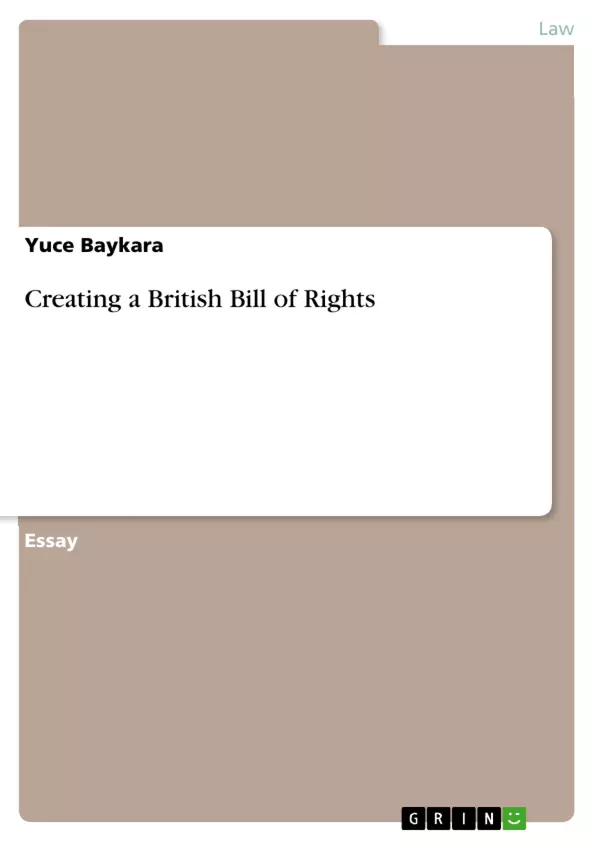A new commission has been set up to investigate the creation of a British Bill of Rights and responsibilities to either replace or supplement the European influenced rights regime. The commission will look at how to build on the obligation set out in the European Convention on Human rights while also addressing the inherent problems with judicial involvement and enshrining it within the law.
It will become evident that the current structure of rights protection in the UK is unique and adapted appropriately for the parliamentary model; however there is a need to build upon Britain’s European Responsibilities while respecting the structure of the political system.
Inhaltsverzeichnis (Table of Contents)
- Creating a British Bill of Rights
- Building on European obligations
- Better Understanding of the obligations
- Enshrined in British Law
- Extending British Liberties
Zielsetzung und Themenschwerpunkte (Objectives and Key Themes)
This text delves into the complex debate surrounding the creation of a British Bill of Rights. It examines the potential benefits and drawbacks of such a document, particularly in light of the UK's existing human rights framework, which is heavily influenced by the European Convention on Human Rights (ECHR). The text explores the need for a balance between individual liberties and the authority of the state, arguing that a British Bill of Rights should be a reflection of national values while also respecting the ECHR's fundamental protections.
- The balance between individual liberties and state authority
- The impact of the ECHR on British law and society
- The need for a British Bill of Rights to reflect national values
- The importance of public involvement and consensus in the development of any new rights document
- The unique legal and political identity of the UK and its lack of a codified constitution
Zusammenfassung der Kapitel (Chapter Summaries)
The first chapter discusses the historical context of the British Bill of Rights debate, highlighting the tension between liberty and authority and the Conservative Party's call for a new approach to human rights protection. It examines the existing human rights framework, focusing on the Human Rights Act 1998 (HRA) and its relationship with the ECHR.
The second chapter explores the importance of building upon the ECHR and respecting the structure of the UK's political system. It acknowledges the public's lack of understanding regarding their rights and the need for greater public engagement and consensus in any new rights document.
The third chapter delves into the unique legal identity of the UK, emphasizing the lack of a codified constitution and the parliamentary sovereignty. It examines the HRA as the only domestic statute that determines future and past legislation.
Schlüsselwörter (Keywords)
The core themes of the text revolve around the concept of a British Bill of Rights, its relationship with the ECHR, and the need for a balance between individual liberties and state authority. Key keywords include: human rights, civil liberties, Bill of Rights, ECHR, HRA, parliamentary sovereignty, national values, public engagement, and constitutionalism.
Frequently Asked Questions
What is the main goal of the proposed British Bill of Rights?
The goal is to investigate creating a document that reflects national British values while either replacing or supplementing the current European-influenced human rights regime, specifically the ECHR.
How does the European Convention on Human Rights (ECHR) affect the UK?
The ECHR significantly influences British law through the Human Rights Act 1998 (HRA), which allows domestic courts to consider Convention rights. The debate focuses on balancing these European obligations with UK parliamentary sovereignty.
What is unique about the UK's constitutional structure regarding rights?
Unlike many other nations, the UK lacks a codified constitution. It relies on parliamentary sovereignty, where the Human Rights Act 1998 is the primary domestic statute governing how legislation interacts with human rights.
Why is public involvement considered important for a new Bill of Rights?
The text argues that there is a lack of public understanding regarding existing rights. Consensus and engagement are necessary to ensure the new document is respected and reflects the identity of the British people.
What are the key themes of the British Bill of Rights debate?
Key themes include the balance between individual liberties and state authority, the role of judicial involvement, national identity, and the preservation of parliamentary sovereignty.
- Arbeit zitieren
- Yuce Baykara (Autor:in), 2011, Creating a British Bill of Rights, München, GRIN Verlag, https://www.grin.com/document/338689



